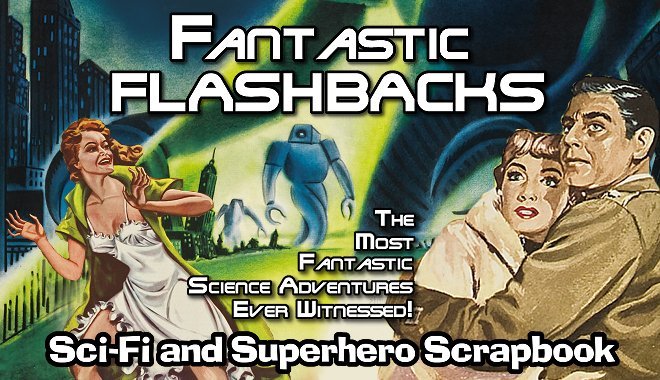
"And my timeline paper beats his, thanks to my superior firepower!"
The chronological timeline of the Apes movies and TV show is quite convoluted, with seeming contradictions scattered throughout. Indeed, many have tried to reconcile the various dates given throughout the series, and their efforts can be found on various sites, such as this one, this one, this one, and this one, among many others (One site that seems to offer an authoritative outline is HassleinBooks.com. I have not bought the book to examine it, but it looks to be the definitive effort so far) . This article from issue #11 of Marvel's 1975 POTA magazine seems to be the first published attempt to track the various dates and events given, in order to try to make sense of it (although it muddies the water somewhat by interjecting the Marvel comics storylines into it). I subscribe to the theory that once Zira and Cornelius come back in time to 1973, they created another timeline that differs from the original, where they did not go back. Their presence (and DNA) cause the ape mutation and uprising to occur much earlier than their history recorded, and I hold that the subsequent film and TV series events are a direct result of this new timeline. In that film the scientific advisor Hasslein thought that the future could be changed, and I think it was, just not in the direction he wanted. (Update: as you can see from the discussion with a knowledgable fan in the comments, there are different views on this.)
The author further submits the possibility, and I tend to agree, that the Zira and Cornelius of the third film may not even be from the same timeline as the first and second film; since it seems so unlikely that they could have located the sunken spaceship, retreived it, repaired it and launched it into space, even with Milo's help. Their technology just wasn't that advanced. The many attempts to catalog the timeline testify to the inconsistencies found in the movies; the carelessness of the writers force us fans into some strange contortions to justify the timeline of the films, indeed! Continuity was not a strong point of the franchise's producers. One thing is certain; we fans have given it much, much more thought than they ever did when creating it. Maybe we should set our brains in "nuetral" and just pop some popcorn and enjoy the films for the light entertainment they were intended to be...
Speaking of timelines, here is one that tracks various events in the real world relative to the production of the Apes franchise and various items associated with it. It's exhaustive, and informative, but ultimately depressing to me, to see how many people that contributed in some way to the Apes story have passed away.






























Just curious, what line of dialogue in any of the films directly supports your theory.
ReplyDeleteAnon,
ReplyDeleteIt has been years since I sat down and watched them in order; I haven't researched it all personally, since I don't have the time and inclination to do so. But my own theory about a diverged timeline stemming from the third film's backwards trip seems to be the most simple explanation for the differences in dates seen and mentioned onscreen. I don't claim to be an authority, that's just my personal explnation, to make it less confusing to tie it all together.
Actually the most "simple" explanation is that the Apes just didn't keep super accurate records of exact dates over a period of 2,000 years. According to Paul Dehn who wrote all of the sequels, the films represent a time circle or loop.
ReplyDeletePossibly true; but when time travel comes into the picture, "simple" goes out the window. But the dates that pose the most problem with reconciling a timeline are not the Apes history lessons (which may be due to lack of recordkeeping or distorted oral tradition), but the differing dates in each of the timeships, which is seen or mentioned whenever their chronometer is referenced. Just sloppy continuity really, but it causes trouble when putting together any timeline.
ReplyDeleteSomething else that made it all more complicated was the assumption that the TV series was set within the same continuity as the films, but I think it was a simple re-boot that existed independently of the films and ignored them to start over in a similar story. Trying to fit it in with the film timeline makes it unnecessarily convoluted. But again, that's just me. The fun comes in all the discussion that it generates!
ReplyDeleteYou should check out the timeline book published here:
ReplyDeletehttp://www.hassleinbooks.com/
"Possibly true; but when time travel comes into the picture, "simple" goes out the window. But the dates that pose the most problem with reconciling a timeline are not the Apes history lessons (which may be due to lack of recordkeeping or distorted oral tradition), but the differing dates in each of the timeships, which is seen or mentioned whenever their chronometer is referenced. Just sloppy continuity really, but it causes trouble when putting together any timeline."
ReplyDeleteThat's exactly the point, these are continuity errors. Remember that these movies were done before the age of home videos so they didn't imagine fans going over the details again and again for years. But when the writer states what the intent of the story is; ignoring that is not seeing the forest for the trees.
I agree that one must ignore the continuity errors to make it all work. But taking them at their face value, which is what many fans do, is what causes the trouble. I have not been aware of Dehn's statement as to the intent; which as you say was a simple time loop as it seems to be onscreen. Your research and insight into it are evidently superior to my casual overview, so I am sure you are right. The big picture outweighs the details... which they say the devil is in, anyway.
ReplyDelete